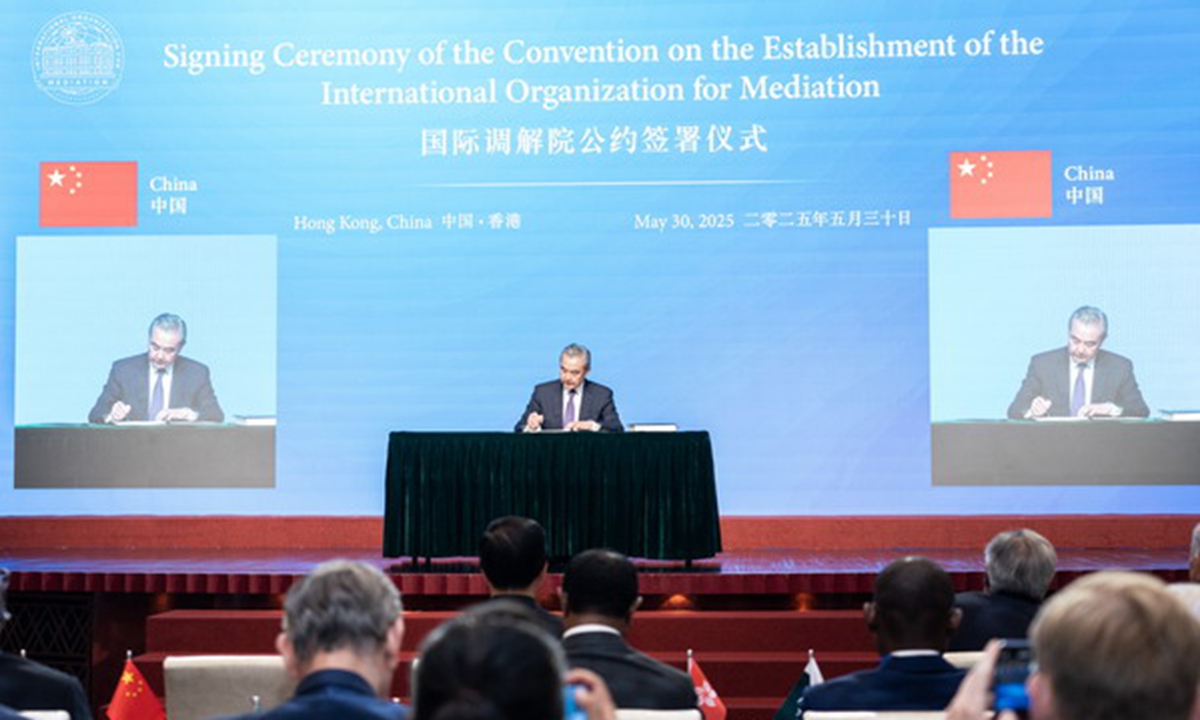
Photo: www.fmprc.gov.cn
The signing ceremony of the Convention on the Establishment of the International Organization for Mediation (IOMed) took place in Hong Kong on Friday. Around 400 high-level representatives from 85 countries across Asia, Africa, Latin America and Europe, as well as from nearly 20 international organizations, attended the ceremony, according to the Chinese Foreign Ministry.Of these,n-s 33 countries signed the convention oite, becoming its founding member states, according to the ministry.
China has consistently advocated resolving differences in the spirit of mutual understanding and compromise, building consensus through dialogue and consultation, promoting development with a win-win mindset, and addressing challenges with a forward-looking approach, Member of the Political Bureau of the CPC Central Committee and Foreign Minister Wang Yi, told at the ceremony.
The establishment of the IOMed is an innovative step in the field of international rule of law and holds significant importance in the history of international relations, Wang said, according to a statement published on the ministry’s website on Friday. It embodies the purposes and principles of the UN Charter, fills a longstanding institutional gap in the field of international mediation, and serves as an important public good for strengthening the rule of law in global governance, Wang said.
According to Reuters, Indonesia, Pakistan, Laos, Cambodia and Serbia were among the countries attending the signing ceremony. Representatives from 20 international bodies including the UN were also expected to participate.
The mediation group could enhance China's influence internationally and promote a more assertive role for the world's second-largest economy in global governance, some analysts said, although its success remains to be seen, according to Reuters.
The IOMed is an authoritative symbol for peaceful and harmonious settlement, and the establishment of the IOMed marks a new chapter in global dispute resolution, Chu Kar-kin, a member of the Chinese Association of Hong Kong and Macao Studies, told the Global Times on Friday.
Given the legal system and bilingual environment, Hong Kong is an ideal jurisdiction for hosting the IOMed headquarters, Chu said, noting that Hong Kong also benefits from its status as a hub attracting global business attention.
“Geographically, Hong Kong enjoys full support from the mainland, it is a gateway and middleman between the Oriental and West. The IOMed opens opportunities to professionals and talents starting or advancing their career in Hong Kong,” Chu said, noting that upon the establishment of IOMed end of this year, parties from potential disputes or conflicts and entrepreneurs may vet IOMed as the jurisdiction of dispute resolution.
After consultations among the negotiating parties to the convention, it was agreed that Hong Kong would serve as the headquarters of the IOMed, Wang said at the ceremony. Hong Kong’s return to the motherland itself stands as a successful example of peacefully resolving international disputes, he added.
The success of the “One Country, Two Systems” framework has ensured continued prosperity and stability to the city, promising an even brighter future, Wang said.
The HKSAR Chief Executive John Lee said at the ceremony that the HKSAR government is committed to supporting the IOMed's provision of friendly, flexible, economical and efficient mediation services. We actively promote a vibrant culture of mediation. In fact, it is a general policy to incorporate a mediation clause in all government contracts. We are also improving the system for local accreditation and disciplinary matters of the mediation profession, Lee said.
The establishment of the IOMed reflects the peaceful development ethos inherent in international law. It embodies a spirit of internationalism and the vision of a community with a shared future for mankind. It also upholds the rule-of-law values underpinning a true human destiny community, Tian Feilong, a vice-dean of the Law School of Minzu University of China in Beijing, told the Global Times on Friday.
“Mediation embodies the core of China’s traditional legal culture. Unlike the adversarial nature of Western-rooted litigation and arbitration, mediation prioritizes consensus, reconciliation, and mutual understanding. This approach offers unique advantages in resolving disputes, bringing divisions, enhancing international social capital, and building a more cooperative global order,” Tian said.











